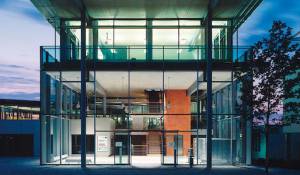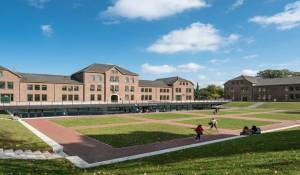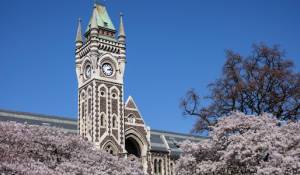When Kim Clarke, then dean of Harvard Business School, greeted 900 new MBA students to the school in 2004, he warned them not to become cynical. The advice seems to have fallen on deaf ears with Philip Delves Broughton, journalist-turned-MBA.
Delves Broughton wrote an occasional ?MBA diary? for the Financial Times while at HBS. Now, in this autobiographical portrait of two years spent in the ?cauldron of capitalism? ? his phrase ? the former Daily Telegraph reporter writes with journalistic ease about everything from the nitty-gritty of the classroom experience to the problems of getting a job.
What makes this a particularly absorbing and entertaining read is the combination of journalistic detachment and the sense of personal alienation that Delves Broughton, a Brit in an American system, feels as he struggles to come to terms with what it means to be a Harvard MBA.
All business schools pride themselves on recruiting ?poets?, the non-traditional students who bring a different perspective to the classroom, usually populated by engineers, bankers or information technology specialists ? or in the case of Harvard, according to Delves Broughton, by the ?three Ms?: mormons, military and McKinsey.
For these ?poets? ? including himself ? the hard-core financial subjects are often unfathomable, he discovers. What he finds almost as difficult is to avoid succumbing to the standard Harvard mould.
This struggle begins in the opening days of the MBA programme when Richard Ruback tells the anecdote of an MBA student arguing with a school administrator. The student proclaims he is ?the customer? and should be better treated. No, says the administrator, ?you?re the product?. Prof Ruback?s comment to the author?s class: ?I guess you?re somewhere between.?
Delves Broughton spends his two years at the business school trying to avoid becoming ?the product? and to resist the lure of money and power, as characterised by those who graduate from this most elite business school. He certainly succeeds. Without giving too much away, Delves Broughton, outsider to the end, is the only one of his cohort of 90 students with no job on graduation.
Two themes stand out. The first is the extent to which students use their two years at HBS, frequently described by the school as transformational, to enact their aspirations and change their working lives. The answer in Delves Broughton?s cohort would seem to be very little, with most graduates succumbing to the inexorable pull of the lucrative banking and consultancy sectors, which they often went to HBS to escape.
The other is that of ethics. During his time at HBS, US business schools faced a dilemma after one applicant found a way to hack into the applications website and discover unofficially whether he had been accepted. He published the relevant web addresses online and many others followed suit, leaving an electronic trail. Harvard, like other top schools, rescinded any offers intended for these applicants. A straw poll in Delves Broughton?s class shows about three-quarters believe the Harvard administration?s decision was ?excessive and self-righteous?.
The incident is carefully juxtaposed with a story about car parking. One January morning Delves Broughton decided to spend $5 to park his Toyota in the student car park. To his surprise, many of the other cars were BMWs or Lexuses ? one was even a Porsche. The author enquires of a fellow student why this should be. The answer comes that many accepted students at Harvard clean out their bank accounts, by buying pricey cars or by transferring funds to their parents? accounts, in order to get financial aid. Everyone on Wall Street knows this ruse, his respondent adds, as do many working in management consultancy.
In spite of everything, Delves Broughton is glad he went to Harvard, where he learnt an enormous amount about business and a good deal about himself. Where he becomes cynical relates to the Harvard ethos and what the business school sees as its ?mission?, which is to ?educate leaders who make a difference in the world?.
It suggests, he argues, that business has a right to impose its will on the world. ?Business needs to re-learn its limits,? he concludes, ?and if the Harvard Business School let some air out of its own balloon, business would listen.? It is probably a message Harvard does not want to hear.
Copyright The Financial Times Limited 2008
Found at http://www.ft.com/cms/s/0/11317232-5e27-11dd-b354-000077b07658.html
Ahead of the Curve
Two Years at Harvard Business School
Philip Delves Broughton
Penguin, $25.95 in the US
What They Teach You at Harvard Business School
My Two Years Inside the Cauldron of Capitalism
Viking, £12.99 in the UK
Delves Broughton wrote an occasional ?MBA diary? for the Financial Times while at HBS. Now, in this autobiographical portrait of two years spent in the ?cauldron of capitalism? ? his phrase ? the former Daily Telegraph reporter writes with journalistic ease about everything from the nitty-gritty of the classroom experience to the problems of getting a job.
What makes this a particularly absorbing and entertaining read is the combination of journalistic detachment and the sense of personal alienation that Delves Broughton, a Brit in an American system, feels as he struggles to come to terms with what it means to be a Harvard MBA.
All business schools pride themselves on recruiting ?poets?, the non-traditional students who bring a different perspective to the classroom, usually populated by engineers, bankers or information technology specialists ? or in the case of Harvard, according to Delves Broughton, by the ?three Ms?: mormons, military and McKinsey.
For these ?poets? ? including himself ? the hard-core financial subjects are often unfathomable, he discovers. What he finds almost as difficult is to avoid succumbing to the standard Harvard mould.
This struggle begins in the opening days of the MBA programme when Richard Ruback tells the anecdote of an MBA student arguing with a school administrator. The student proclaims he is ?the customer? and should be better treated. No, says the administrator, ?you?re the product?. Prof Ruback?s comment to the author?s class: ?I guess you?re somewhere between.?
Delves Broughton spends his two years at the business school trying to avoid becoming ?the product? and to resist the lure of money and power, as characterised by those who graduate from this most elite business school. He certainly succeeds. Without giving too much away, Delves Broughton, outsider to the end, is the only one of his cohort of 90 students with no job on graduation.
Two themes stand out. The first is the extent to which students use their two years at HBS, frequently described by the school as transformational, to enact their aspirations and change their working lives. The answer in Delves Broughton?s cohort would seem to be very little, with most graduates succumbing to the inexorable pull of the lucrative banking and consultancy sectors, which they often went to HBS to escape.
The other is that of ethics. During his time at HBS, US business schools faced a dilemma after one applicant found a way to hack into the applications website and discover unofficially whether he had been accepted. He published the relevant web addresses online and many others followed suit, leaving an electronic trail. Harvard, like other top schools, rescinded any offers intended for these applicants. A straw poll in Delves Broughton?s class shows about three-quarters believe the Harvard administration?s decision was ?excessive and self-righteous?.
The incident is carefully juxtaposed with a story about car parking. One January morning Delves Broughton decided to spend $5 to park his Toyota in the student car park. To his surprise, many of the other cars were BMWs or Lexuses ? one was even a Porsche. The author enquires of a fellow student why this should be. The answer comes that many accepted students at Harvard clean out their bank accounts, by buying pricey cars or by transferring funds to their parents? accounts, in order to get financial aid. Everyone on Wall Street knows this ruse, his respondent adds, as do many working in management consultancy.
In spite of everything, Delves Broughton is glad he went to Harvard, where he learnt an enormous amount about business and a good deal about himself. Where he becomes cynical relates to the Harvard ethos and what the business school sees as its ?mission?, which is to ?educate leaders who make a difference in the world?.
It suggests, he argues, that business has a right to impose its will on the world. ?Business needs to re-learn its limits,? he concludes, ?and if the Harvard Business School let some air out of its own balloon, business would listen.? It is probably a message Harvard does not want to hear.
Copyright The Financial Times Limited 2008
Found at http://www.ft.com/cms/s/0/11317232-5e27-11dd-b354-000077b07658.html
Ahead of the Curve
Two Years at Harvard Business School
Philip Delves Broughton
Penguin, $25.95 in the US
What They Teach You at Harvard Business School
My Two Years Inside the Cauldron of Capitalism
Viking, £12.99 in the UK



